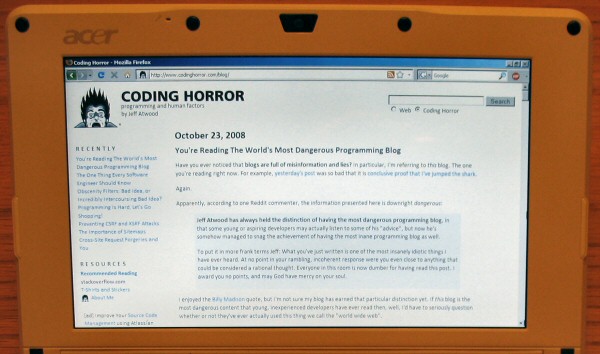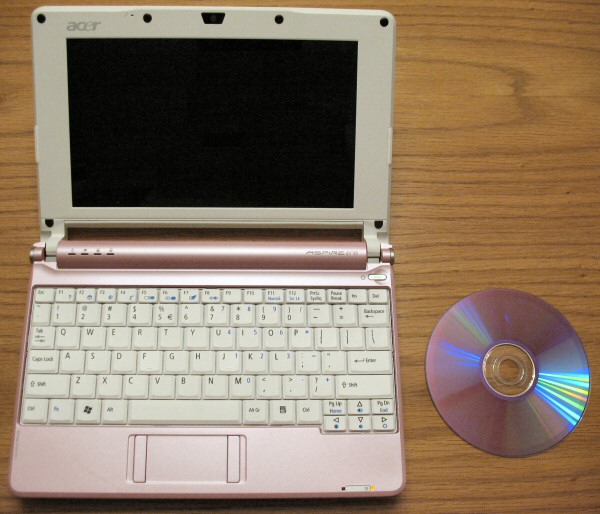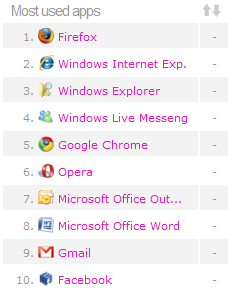I've been reading a lot of good things about the emerging "netbook" category of subnotebooks:
The term netbook refers to a category of small to medium sized, light-weight, low-cost, energy-efficient, Internet-centric laptops, generally optimized for Web surfing and e-mailing.
Like any self-respecting nerd, I already own a laptop, of course, but my wife has taken to surfing the internet at night and doing her Java-based New York Times crosswords in bed. Plus there's the whole pregnancy thing, so it'd be nice for her to have her own "space" laptop-wise. So I pulled the trigger on an Acer Aspire One netbook.
The specs are indeeed modest, but not bad at all for the $369 sticker price:
- Intel Atom 1.6 Ghz CPU
- 802.11 b/g wireless
- 1 GB ram
- 120 GB hard drive
- 8.9" 1024x600 display
- Windows XP Home
- webcam, mic, 3 usb ports, ethernet, vga out.
I didn't expect much from this cheap, diminutive laptop; it's mostly for web surfing, light email, maybe a tiny bit of miscellaneous office work. And in case the color choice didn't make it clear, it's not even for me. That's my story, and I'm sticking to it!
As I sat down to configure this machine, I belatedly realized that for most of what I do with a computer, this cute little netbook is perfectly adequate. Sure, the keyboard is a bit cramped, it's no performance powerhouse, and the screen size, at 1024 x 600, is definitely the minimum necessary for it to be practical. It took some adaptation, but it wasn't frustrating or disappointing to use. It delivered (almost) the same web experience I'd get on my desktop or laptop, with no serious compromises. It just.. worked.

As stupid as it sounds, I had fallen in love with this silly little netbook.
But even that's not the whole story -- after spending some time with a netbook, I realized that calling them "small laptops" is a mistake. Netbooks are an entirely different breed of animal. They are cheap, portable web browsers.
The most popular application in the world is the web browser. By far. Number two isn't even close. Just check out the front page of Wakoopa's most used apps:
By my reckoning, six of the top 10 "apps" here are actually web browsers or websites running in web browsers. It's certainly consistent with how my wife and I are increasingly using our computers. Every day, more and more of what we need to do is delivered through a browser, with fewer and fewer compromises. I spend ridiculous, unhealthy amounts of time browsing the web, and this netbook does that with aplomb.
At this point, who cares what operating system you run? Choice of web browser will have a far more profound impact on most people's daily lives. As the prices for netbooks inevitably collapse, they are poised to transform the entire computer market, threatening both Apple and Microsoft.
- Apple laptops are beautiful, but I can't imagine the average user who spends all their time in the web browser paying 3 to 4 times the price of a netbook for a Mac laptop. Macs are brilliantly designed, it's true, but that's a hell of a tax to run Safari.
- Speaking of taxes, what about the Microsoft Tax? I'm already heavily infatuated with the current iteration of netbooks as represented by the Aspire. And they can only get better and cheaper over time. Imagine a machine with the same specs as the Aspire One but at $299, $199, maybe even $99. It's going to happen. It's inevitable. This is a huge opening for Linux; it's the ideal way to deliver a complete, modern web browser at nearly zero marginal cost to both the vendor and consumer.
- The booming growth of netbooks will keep Windows XP alive much longer than expected. As much as I like Vista as a solid (if not stellar) upgrade from XP, the prehistoric 2001 era system requirements for XP still make it a better choice for these kinds of devices. 1 GB of memory is roomy; a measly 16 GB of disk space plenty. Can't say that for Vista. No sir. It's also an opportunity for Microsoft to play games with the Linux market by reducing the price of XP to crazy low, fire sale, everything-must-go levels. But only for "select" and "preferred" OEM vendors, of course, not for the common folks on the street.
I won't lie. One of the attractions of this particular model is that it runs Windows XP, an operating system I, and every other software vendor on the planet, know by heart. It'll run whatever without me having to think too much about it. But I could easily see myself leaving some of that potential flexibility on the table if the price dropped to $199 or so. If it runs Firefox 3, or Chrome, or Opera, that's about all I need.
I'm quite happy with our Acer Aspire One netbook for now, but I'll probably be picking up one of the next generation of netbooks for myself.
I agree with Omar that Netbooks are poised to transform computing. They still have a way to go, of course, but the $299 or $199 no-compromises, go-anywhere, zero-monthly-contract-fees web browser in the palm of your hand -- with the requisite 9" or larger screen -- is almost upon us. I guess I hadn't been paying enough attention, because that's a shocker to me.
Pitching the web browser as a bona-fide operating system always seemed stupid to me. Or at least it did, until I sat down with my first netbook. If I were Apple or Microsoft, I'd I'd be watching this category of devices very, very closely.

